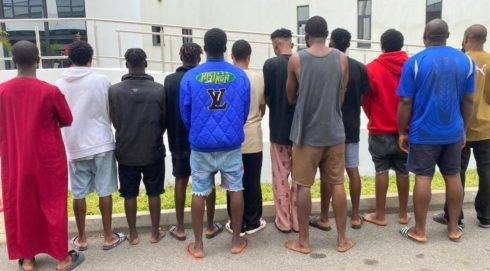In a decisive operation aimed at curbing cybercrime, the Economic and Financial Crimes Commission (EFCC) apprehended 40 individuals suspected of internet fraud in various parts of Abuja on Friday, May 31, 2024. This large-scale arrest, conducted in response to credible intelligence, highlights the ongoing efforts of the EFCC to combat financial crimes and protect citizens from cybercriminal activities.
During the operation, EFCC operatives detained 18 suspects at the Dawaki axis, a known hotspot for illicit online activities. The remaining 12 suspects were apprehended in different locations across Abuja, reflecting the widespread nature of these fraudulent operations. The EFCC’s swift action underscores their commitment to tackling the rising threat of internet fraud, which has become a significant concern in Nigeria.
Seized Items and Legal Proceedings
In addition to the arrests, the EFCC recovered a substantial amount of evidence linked to the alleged crimes. Among the items seized from the suspects were 23 mobile phones, 4 laptops, and 4 vehicles. These items are believed to have been used in the execution of fraudulent schemes, further incriminating the suspects. The confiscation of these tools is expected to aid in the ongoing investigations and eventual prosecution of the individuals involved.
The EFCC has announced that the suspects will be charged to court once investigations are concluded. This step is crucial in ensuring that those responsible for defrauding unsuspecting victims are held accountable. The EFCC’s actions not only aim to bring the perpetrators to justice but also serve as a deterrent to others involved in similar illegal activities. The commission continues to urge the public to remain vigilant and report any suspicious activities, contributing to the broader fight against cybercrime in Nigeria.
EFCC Urges Nigerians to Fulfill Tax Obligations
The Kano Zonal Director of the Economic and Financial Crimes Commission (EFCC), CE Ibrahim Shazali, has emphasized the importance of tax compliance for Nigeria’s sustainable development. During a meeting in Kano on May 28, 2024, Shazali urged all Nigerians to adhere to their tax responsibilities, underscoring that consistent tax payments are crucial for the nation’s economic growth. He highlighted that fulfilling tax obligations is not just a statutory requirement but also a civic duty that can significantly impact national prosperity.
Shazali’s appeal came during a courtesy visit from the Kano Tax Comptroller of the Federal Inland Revenue Service (FIRS), Mr. Umar Halilu Abubakar. The Economic and Financial Crimes Commission Director called on FIRS in Kano State to intensify its tax collection efforts, noting that a robust tax system could enhance revenue generation, thereby jumpstarting development across various economic sectors. He stated, “It is crucial for us to understand that paying taxes is not merely a statutory responsibility but a civic duty with profound implications for national prosperity.”
FIRS and EFCC Collaborate to Combat Tax Evasion
Mr. Umar Halilu Abubakar, the Kano Tax Comptroller of FIRS, supported Shazali’s views on the critical role of tax compliance in national development. During his visit to the EFCC, Abubakar described the meeting as an essential step towards fostering cooperation between the two agencies. He emphasized that combating tax evasion and strengthening tax compliance mechanisms among Nigerians are key priorities for FIRS.
Abubakar’s visit aimed to enhance collaboration with the EFCC in tackling tax evaders. He highlighted the necessity of mutual support between FIRS and the EFCC to effectively address tax evasion issues, thereby ensuring that more Nigerians comply with their tax obligations. Abubakar stated, “Our main objective is to familiarize ourselves with the Economic and Financial Crimes Commission’s operations and seek their support in our ongoing efforts to enforce tax compliance and combat tax evasion.”
By working together, the EFCC and FIRS aim to create a more efficient and effective tax system that will bolster Nigeria’s economic growth and development. This partnership is expected to lead to improved tax revenue, which can be reinvested in various developmental projects across the country.
Table of Contents
Discover more from OGM News NG
Subscribe to get the latest posts sent to your email.














